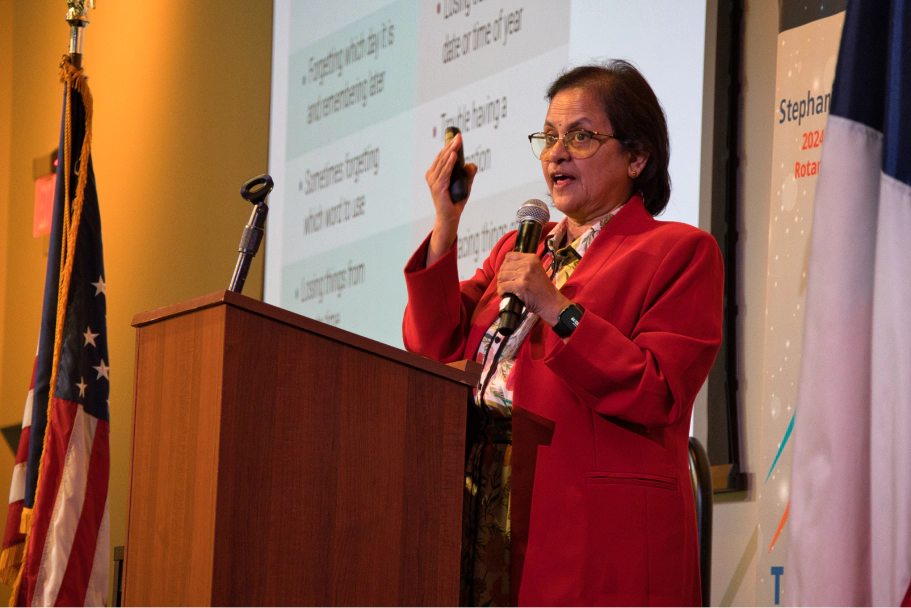
Alzheimer’s Expert Dr. Sudha Seshadri Speaks on Dementia Research and Brain Health

At the June 18 Rotary Club of San Antonio luncheon, Dr. Sudha Seshadri, founding director of the Glenn Biggs Institute for Alzheimer’s and Neurodegenerative Diseases at UT Health San Antonio, delivered an inspiring and information-rich presentation on the future of dementia care, prevention, and research.
Dr. Seshadri, a distinguished behavioral neurologist with deep personal ties to Alzheimer’s, recounted how she was drawn to San Antonio in 2017 by the community’s long-term commitment to tackling brain diseases—especially in underserved populations in South Texas. Since then, the Biggs Institute has grown into a nationally designated Alzheimer’s Disease Research Center and a beacon for cutting-edge research and compassionate care.
Her talk covered three main themes: the evolving understanding of dementia, new treatments and diagnostics, and how individuals and communities can protect brain health.
Dr. Seshadri explained that dementia is not a single disease but a syndrome with many causes, including Alzheimer’s, vascular disease, frontotemporal dementia, and Lewy body dementia. She emphasized that diagnosing these conditions now increasingly involves advanced tools such as PET scans, spinal fluid biomarkers, and even skin tests—enabling earlier and more precise detection.
Excitingly, two new FDA-approved drugs—lecanemab and donanemab—show promise in slowing Alzheimer’s progression in its earliest stages. However, their benefits are modest, require IV infusions, and carry some risk of side effects, particularly in individuals with certain genetic markers.
Much of the talk focused on resilience and prevention. Dr. Seshadri stressed that lifestyle factors such as controlling blood pressure and diabetes, staying physically and mentally active, treating hearing and vision loss, and avoiding head injuries can significantly reduce dementia risk—even for those with high genetic susceptibility.
She also shared updates on local research efforts, including the San Antonio Heart and Mind Study, investigating cognitive aging in South Texans, and community-partnered studies using diet, microbiome analysis, and even brainwave therapy to explore innovative pathways to prevention and care.
The new Center for Brain Health at UT Health, opening soon, will serve not just as a clinical site but as a collaborative space for patients, caregivers, and scientists. Programs like GUIDE are already bringing care into homes, with support for caregivers now covered by Medicare and Medicaid.
Dr. Seshadri closed by thanking the San Antonio community and the Rotary Club for their unwavering support and engagement. “We now have the opportunity not only to understand this disease better,” she said, “but to shape the future of care and prevention—for all people, and especially those who have been historically underserved.”
Rotarians left the luncheon not only more informed about the science of brain health, but inspired by the vision of a healthier, more inclusive future.


.svg)
.svg)
.svg)
